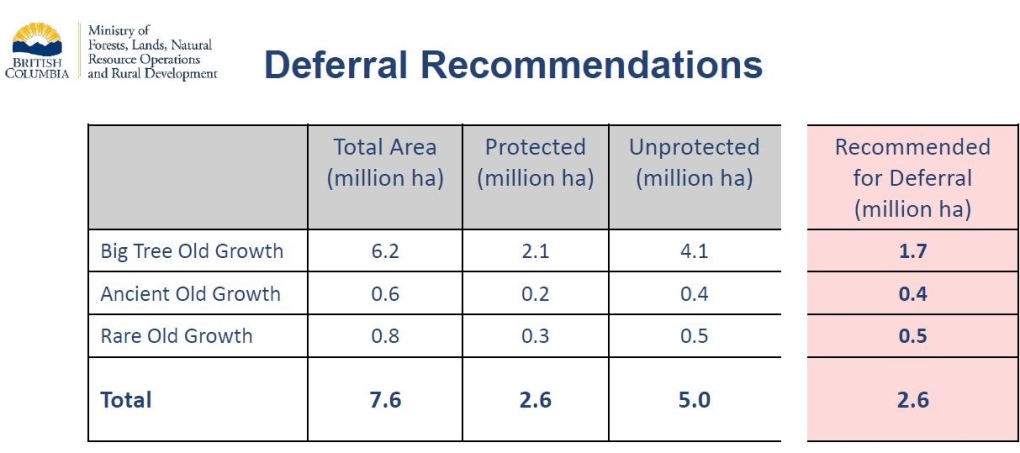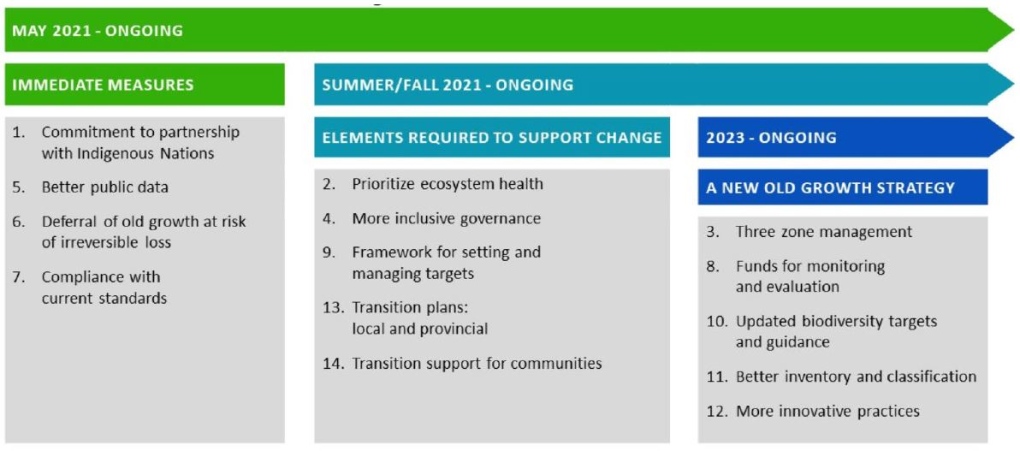B.C. old-growth: Province proposes 2.6M hectare logging deferral
The B.C. government says logging deferrals could be coming to up to 2.6 million hectares of old-growth forest, pending discussions with affected First Nations.
The deferrals are based on recommendations from the Old Growth Strategic Review, which was presented in 2020 – and recent work completed by the independent Technical Advisory Panel (TAP).
Currently, the province has an estimated 11.1 million hectares of old-growth forest, of which 3.5 million is protected. The remaining 7.6 million is considered "unprotected," where logging is largely permitted.
TAP recommended deferring logging in old-growth areas that were considered particularly rare, such as "big tree old-growth," "ancient old-growth" and "rare old-growth."
These three types of old-growth forests account for 7.6 million hectares of the total 11.1 million hectares of old-growth in B.C.
While 3.5 million hectares of old-growth forest are already protected, the province says up to 2.6 million more could soon be deferred from logging for the next two years.
 Nov. 2, 2021 (Province of B.C.)
Nov. 2, 2021 (Province of B.C.)
The B.C. government says the deferrals will be implemented if affected First Nations agree with the proposed harvesting restrictions. The province hopes to receive responses from impacted First Nations within the next 30 days.
"Deferral is not equivalent to protection; deferral maintains at-risk old forests in the short-term," reads a report from the Technical Advisory Panel.
The deferrals could lead to permanent harvesting restrictions, but nothing will be decided until a new old-growth management strategy is fully formed years from now.
IMPACTS ON INDUSTRY
The province says that it will be engaging with forestry workers on how to manage the economic impacts of the deferrals.
Current support programs in place for the industry will also be expanded as the deferrals are introduced, says the province.
"Programs will include connecting workers with short-term employment opportunities, education and skills training or funds to bridge to retirement," said the province in a statement Tuesday.
"The province will also work in partnership with business and communities to develop new supports that will assist rural communities to create jobs through diversified economies, infrastructure projects and innovation in industry."
The deferrals announced Tuesday are just one of 14 recommendations that were included in the Old Growth Strategic Review. The province says it is committed to implementing all 14 recommendations.
In the meantime, the province says it will "immediately cease" advertising and selling BC Timber Sales in the proposed areas.
 A rough timeline of when the province plans to implement the 14 recommendations posed in the Old Growth Strategic Review are shown: Nov. 2, 2021 (Province of B.C.)
A rough timeline of when the province plans to implement the 14 recommendations posed in the Old Growth Strategic Review are shown: Nov. 2, 2021 (Province of B.C.)
CONSERVATIONISTS RESPOND
Conservation groups are slamming the provincial government's latest attempt at managing old-growth logging in B.C.
The groups and Indigenous land defenders say while maps and actual data about old-growth is helpful, this latest plan does not stop logging threats to the aged forests.
The groups have called for an outright ban of all old-growth logging in the province.
"There have been far too many misleading claims made about there being lots of old-growth left and we’re grateful to see that put to bed once and for all," said Torrance Coste with The Wilderness Committee.
"However, it’s been well over a year since the Old Growth Strategic Review. It’s way too late to just clarify intentions without acting on them," he said.
Coste adds that the proposed deferrals put affected First Nations in a difficult position.
"Without providing the means for First Nations to defer old-growth forests without potentially losing revenue, the government is forcing communities to make an impossible choice," Coste said in a communication from The Wilderness Committee.
The provincial plan does come with $12.69 million in capacity funding to support the deferral process for First Nations over the next three years.
Once the deferral period ends, the newly identified at-risk forests will either be added to B.C.’s list of off-limits logging zones, or included in new forest management plans.
CTVNews.ca Top Stories

NEW After hearing thousands of last words, this hospital chaplain has advice for the living
Hospital chaplain J.S. Park opens up about death, grief and hearing thousands of last words, and shares his advice for the living.
BREAKING Police cordon off Iran consulate in Paris where man threatens to blow himself up: French media
French police cordoned off the Iranian consulate in Paris on Friday, where a man was threatening to blow himself up, Europe 1 radio and BFM TV.
Some Canadian families will receive up to $620 per child today
More money will land in the pockets of some Canadian families on Friday for the latest Canada Child Benefit installment.
BREAKING Iran fires at apparent Israeli attack drones near Isfahan air base and nuclear site
An apparent Israeli drone attack on Iran saw troops fire air defences at a major air base and a nuclear site early Friday morning near the central city of Isfahan, an assault coming in retaliation for Tehran's unprecedented drone-and-missile assault on the country.
American millionaire Jonathan Lehrer denied bail after being charged with killing Canadian couple
American millionaire Jonathan Lehrer, one of two men charged in the killings of a Canadian couple in Dominica, has been denied bail.
Ottawa to force banks to call carbon rebate a carbon rebate in direct deposits
Canadian banks that refuse to identify the carbon rebate by name when doing direct deposits are forcing the government to change the law to make them do it, says Environment Minister Steven Guilbeault.
Ontario woman loses $15,000 to fake Walmart job scam
A woman who recently moved to Canada from India was searching for a job when she got caught in an online job scam and lost $15,000.
After COVID, WHO defines disease spread 'through air'
The World Health Organization and around 500 experts have agreed for the first time on what it means for a disease to spread through the air, in a bid to avoid the confusion early in the COVID-19 pandemic that some scientists have said cost lives.
Prince Harry formally confirms he is now a U.S. resident
Prince Harry, the son of King Charles III and fifth in line to the British throne, has formally confirmed he is now a U.S. resident.
































